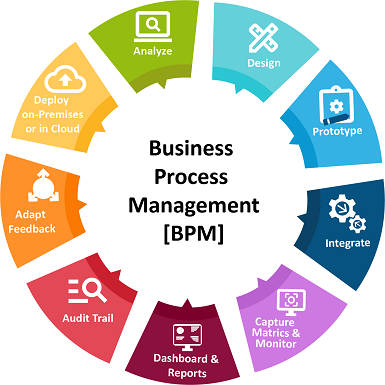Business Process Management Market Overview:
The Business Process Management (BPM) market has emerged as a critical pillar of organizational success in the digital age, facilitating streamlined operations, increased agility, and enhanced customer satisfaction. BPM solutions integrate advanced technologies such as AI, machine learning, and cloud computing to automate, monitor, and optimize business processes. With the rise of digital transformation initiatives across industries, the BPM market is witnessing significant global expansion.
The Business Process Management Market size is projected to grow USD 63.4 Billion by 2032, exhibiting a CAGR of 18.9% during the forecast period 2024 - 2032. Organizations across sectors like banking, IT, healthcare, retail, and manufacturing are adopting BPM tools to improve efficiency, reduce costs, and enhance process visibility.
Get a sample PDF of the report at –
https://www.marketresearchfuture.com/sample_request/3408
Market Segmentation:
The global BPM market is segmented based on component, deployment type, business function, organization size, industry vertical, and region. By component, the market is divided into solutions and services. Solutions include automation, process modeling, monitoring, and optimization. Services cover consulting, integration, and support.
Deployment-wise, cloud-based BPM solutions are gaining dominance due to scalability and lower infrastructure costs, though on-premise deployments remain significant in data-sensitive sectors. In terms of business function, BPM is widely adopted for human resources, procurement, supply chain management, customer service, and finance operations.
Organizations of all sizes—small, medium, and large enterprises—are leveraging BPM to gain competitive advantages. Vertically, industries such as BFSI, IT & telecom, healthcare, retail, government, and manufacturing are leading adopters of BPM solutions.
Key Market Players:
Several prominent players are driving innovation and competition in the BPM market. Major companies include:
- IBM Corporation
- Oracle Corporation
- Appian Corporation
- Pegasystems Inc.
- Software AG
- TIBCO Software Inc.
- BP Logix, Inc.
- Nintex Global Ltd.
- Kissflow Inc.
- SAP SE
These companies focus on strategic partnerships, product launches, and acquisitions to enhance their offerings and global reach. Cloud-native platforms, AI integration, and low-code capabilities are among the key differentiators fueling competition.
Industry News:
Recent developments in the BPM landscape highlight the growing focus on intelligent automation, cloud-native architectures, and AI-driven decision-making. In 2024, Appian launched new AI-powered process automation capabilities to enhance enterprise agility. Similarly, IBM and Salesforce partnered to integrate BPM with customer experience platforms, reflecting the merging of operational and customer-centric strategies.
Other significant updates include the growing investment in industry-specific BPM tools tailored to finance, logistics, and healthcare, emphasizing regulatory compliance and sector-specific workflows.
Recent Developments:
Oracle introduced new updates to its BPM Cloud platform, incorporating enhanced AI analytics and cross-functional workflow support.
Pegasystems acquired Everflow to strengthen its process mining capabilities.
Nintex expanded its regional operations in Asia-Pacific, targeting emerging markets with simplified workflow automation.
Software AG focused on enhancing real-time process insights through its ARIS platform.
SAP integrated BPM capabilities into its enterprise resource planning (ERP) suite to offer a more unified experience.
These moves reflect a strong push toward end-to-end automation, AI integration, and real-time analytics in the BPM space.
Market Dynamics:
Drivers
The primary drivers fueling BPM market growth include:
- Increasing demand for digital transformation and process automation
- The shift toward cloud-based BPM solutions for cost-efficiency and scalability
- Rising need for regulatory compliance and process transparency
- Emergence of AI, RPA (Robotic Process Automation), and IoT technologies
- Growing adoption in SMEs due to the availability of low-code/no-code BPM tools
Challenges
Despite rapid growth, the BPM market faces certain hurdles:
- High initial investment and integration complexity for large enterprises
- Resistance to change and lack of internal process expertise
- Security and data privacy concerns in cloud-based deployments
Opportunities
Emerging markets in Asia-Pacific and Latin America present vast opportunities due to rising IT infrastructure investments. The integration of predictive analytics, process mining, and hyperautomation creates further potential for innovation and expansion.
Browse a Full Report –
https://www.marketresearchfuture.com/reports/business-process-management-market-3408
Regional Analysis:
North America
North America holds the largest market share, driven by technological maturity, widespread cloud adoption, and the presence of key BPM vendors. The U.S. dominates due to its robust enterprise tech ecosystem and strong focus on operational efficiency.
Europe
Europe is experiencing steady growth, led by the UK, Germany, and France. Regulatory frameworks like GDPR have compelled organizations to adopt BPM for compliance and process governance.
Asia-Pacific
Asia-Pacific is the fastest-growing region, with countries like China, India, Japan, and Australia investing heavily in digital business transformation. The surge in startups, coupled with increasing cloud adoption, is propelling BPM deployment.
Latin America and Middle East & Africa
These regions are gradually adopting BPM technologies as part of broader digital transformation agendas. Government initiatives and foreign investments are fostering BPM growth in sectors like healthcare, finance, and public services.
The global Business Process Management market stands at the forefront of enterprise modernization, playing a pivotal role in enhancing operational agility, compliance, and productivity. With continuous innovations, cloud transformation, and AI integration, BPM is no longer just an operational tool but a strategic enabler. As businesses worldwide prioritize process efficiency and digital excellence, the BPM market is set to witness sustained growth and evolving capabilities across all industries.
Contact
Market Research Future (Part of Wantstats Research and Media Private Limited)
99 Hudson Street, 5Th Floor
New York, NY 10013
United States of America
+1 628 258 0071 (US)
+44 2035 002 764 (UK)
Email: sales@marketresearchfuture.com
Website: https://www.marketresearchfuture.com

